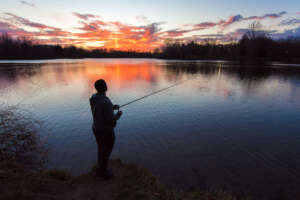The National Science Foundation (NSF) has awarded $1.5 million to a multidisciplinary team of faculty researchers at the University of Notre Dame who are working to protect wildlife from impending threats caused by climate change. The project, “Exploiting Federal Data and Beyond: A Multi-modal Knowledge Network for Comprehensive Wildlife Management under Climate Change,” will result in a comprehensive platform to support data-driven approaches to wildlife management.
Changes in climate can make it difficult to manage threatened, invasive, or economically important species. The new platform, KN-Wildlife, will safeguard biodiversity while also ensuring ecosystem health and the economic stability of wildlife. The platform offers interactive tools that can predict and visualize the spread distribution of species’ habitat across geographic areas, and enables the dynamic adjustment of environmental variables, allowing users to probe potential implications of climate factor changes on managed species.
During its first phase, KN-Wildlife will focus on around 3000 managed species by extending the species of concerns from the stakeholders, such as the Fish and Wildlife Commissions (FWC) and Departments of Health (DoH) in Indiana and Florida.

The species cover a wide range of taxonomy from fungi and bacteria to fish and mammals. A comprehensive knowledge network will be established by incorporating the vast amount of federal data from sources like the United States Geological Survey, the Global Biodiversity Information Facility, the IUCN Red List of Threatened Species, and others.
“We envision KN-Wildlife as an open-access platform that can provide a unified representation of managed species” said Xiangliang Zhang, associate professor in the Department of Computer Science and Engineering and lead principal investigator for the proposal.
She explained that, “by designing a unified resource, we are equipping wildlife stakeholders with the knowledge they need to make informed decisions that ensure a thriving and sustainable future for wildlife everywhere.”
The platform is also being supported by co-principal investigators Nitesh Chawla, Founding Director of the Lucy Institute for Data & Society and Frank M. Freimann Professor of Computer Science and Engineering as well as Jason Rohr, the Ludmilla F., Stephen J. and Robert T. Galla College Professor and Department Chair in the Department of Biological Sciences.
KN-Wildlife will have a broad impact on both research and education at the University of Notre Dame. The user-friendly design and interactive features will encourage its usage among students, faculty, and researchers, facilitating an enriching learning and discovery experience.

Aligned with the Lucy Family Institute for Data & Society’s mission to adventurously collaborate towards addressing society’s “wicked problems,” Chawla expressed his excitement upon receiving word of the NSF grant, which he explains will have, “wide-reaching applications in, fostering interdisciplinary research across the fields of computer science, ecology, biogeography, and many more.”
Within the Lucy Family Institute, to achieve the broader impact, the team has plans to, “integrate the use of platform into the NSF-funded Interdisciplinary Traineeship for Socially Responsible and Engaged Data Scientists (iTREDS) and the Summer Education and Engagement for Data Science (SEEDS) programs.”
All KN-Wildlife resources will be made publically available at a later date. For more information on the NSF grant award, please visit the National Science Foundation’s award announcement page.
Contact:
Christine Grashorn, Communications Specialist
Notre Dame Research / University of Notre Dame
cgrashor@nd.edu / 574.631.4856
research.nd.edu / @UNDResearch
About the Lucy Family Institute for Data & Society
Guided by Notre Dame’s Mission, the Lucy Family Institute adventurously collaborates on advancing data-driven convergence research, translational solutions, and education to ethically address society’s wicked problems. As an innovative nexus of academia, industry, and the public, the Institute also fosters data science access to strengthen diverse and inclusive capacity building within communities. Our vision is to become the preeminent intellectual beacon, inspiring collaborative, equitable, and impactful data innovations as a global force for good.
